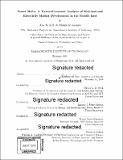Power shifts : a techno-economic analysis of multinational electricity market development in the Middle East
Author(s)
De Monts de Savasse, Alix M. A. H. (Alix Marie A. H.)
DownloadFull printable version (16.38Mb)
Alternative title
Techno-economic analysis of multinational electricity market development in the Middle East
Other Contributors
Technology and Policy Program.
Advisor
Olivier L. de Weck, Ignacio J. Pérez-Arriaga and Karen Tapia-Ahumada.
Terms of use
Metadata
Show full item recordAbstract
Electricity demand has been rising rapidly in the six Gulf Cooperation Council (GCC) countries (Bahrain, Kuwait, Oman, Qatar, Saudi Arabia, and the United Arab Emirates). As a result, the diversification and sustainable transition of their electricity sectors has been a priority. As part of these efforts, the GCC countries interconnected their electricity grids in 2011, with the aim of sharing reserve capacity, thus enhancing system reliability. The GCC has sought to further utilize this interconnection by developing a regional market in order to exchange power real-time across borders and reap the economic efficiencies of regional trade. However, the utilization rate of the interconnector remains low (around 8%) due to fuel subsidies, different stages of national electricity market development, and the lack of clear trading rules. This thesis analyzed how the interconnector could be better utilized. A network constrained multi-period economic dispatch with optimal DC power flow and uniform loss representation model was developed in order to assess the economic benefits of cross-border trade within the GCC. It covered fifteen years of planned capacity expansions, from 2016 to 2030, resulting in a model that incorporates 428 power plants across the six GCC countries and a high-level network representation with 26 nodes and 68 high-voltage transmission lines. Analysis specifically focused on how operational costs (fuel and variable operation & maintenance costs) and electricity prices could be reduced by trading power across borders on current and planned GCC infrastructure. Based on the data available, our model revealed that about USD $1 Billion could be saved in annual operational costs (about 2% when using international fuel prices) from this regional electricity trade. The model also revealed the overwhelming impact of fuel subsidies, calculating that the GCC would spend more on fuel subsidies for electricity production annually (around USD $60 Billion) than the complete yearly operational costs of the six countries combined without. Removal of subsidies would significantly affect the volume and direction of exports across the network, flipping some countries from net importers to exporters, as well as impacting the utilization rate of transmission lines.
Description
Thesis: S.M. in Technology and Policy, Massachusetts Institute of Technology, School of Engineering, Institute for Data, Systems, and Society, 2018. Cataloged from PDF version of thesis. Includes bibliographical references (pages 103-107).
Date issued
2018Department
Massachusetts Institute of Technology. Engineering Systems Division; Massachusetts Institute of Technology. Institute for Data, Systems, and SocietyPublisher
Massachusetts Institute of Technology
Keywords
Institute for Data, Systems, and Society., Engineering Systems Division., Technology and Policy Program.